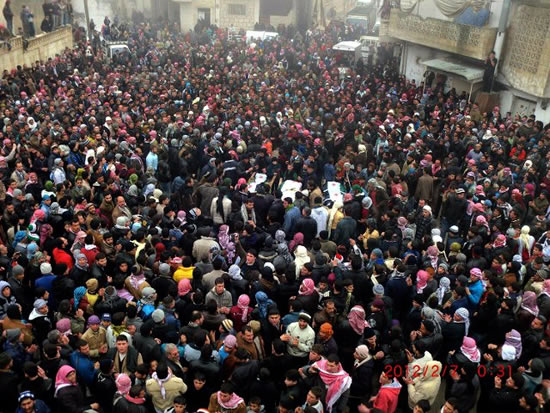
Syrian mourners gather around the bodies of people allegedly killed by Syrian government forces during a funeral procession in Maarat al-Noman, Idlib province, Syria, February 7, 2012. UPI
You can tell how serious the situation in Syria is getting by looking at the recent actions taken by its neighbors.
Earlier this week, the Gulf Cooperation Council—a regional intergovernmental grouping consisting of Bahrain, Kuwait, Oman, Qatar, Saudi Arabia, and the United Arab Emirates—released a condemning proclamation against the Assad Regime and recalled their ambassadors from Damascus.
Yesterday, Turkish Prime Minister Recep Tayyip Erdo?an stated that Turkey is preparing a new initiativewith countries that oppose the current Syrian regime. Although the announcement was vague, the message was serious. Turkey has already provided sanctuary to Syrian army defectors and thousands of Syrian refugees. Erdo?an has also dispatched his foreign secretary to Washington for urgent talks.
It was announced yesterday that the European Union is working on a new round of sanctions against Syria. According to EU diplomats, the sanctions will include freezing the assets of Syria’s central bank and banning the import and export of phosphates, precious metals, and diamonds. There is also talk of the EU banning commercial aircraft between EU member states and Syria. The aim is to have these sanctions ready for agreement by the next the regularly scheduled European foreign ministers meeting on February 27.
With the sense of urgency shown by many of Syria’s regional neighbors, EU decision makers needs to realize that international crises do not fit neatly into bureaucratic timetables. Foreign ministers should be meeting in Brussels tomorrow. February 27 is a long time to wait for people fighting for their lives in Homs.
The 27 countries that form the EU make it Syria’s number one trading partner in the world. In 2010, EU–Syria trade volume increased by 33 percent and had a total value of €7.18 billion. Therefore, meaningful EU trade sanctions could have a real impact on the Syrian regime. The EU has already banned oil imports from Syria into the EU.
Freezing the assets of Syria’s central bank and banning the import and export phosphates, precious metals, and diamonds is a further step in the right direction. As difficult as it will be for all 27 EU members to establish a common position, EU leaders should go ahead with banning commercial air traffic when they agree to the next round of sanctions. As stated in research by The Heritage Foundation recently, the EU and the U.S. need to work closely together on any future economic sanctions.
Beyond the institution of the EU, European countries can also do more on a bilateral basis. The United Kingdom and France have done the right thing by recalling their ambassadors from Damascus. The British have also gone as far as meeting with members of the Syrian opposition. This sends a clear message to the regime, and the U.K.’s example should be followed by others in Europe.
If the Europeans play their cards right, they could help the rest of the world place tremendous pressure on the regime before it is too late.